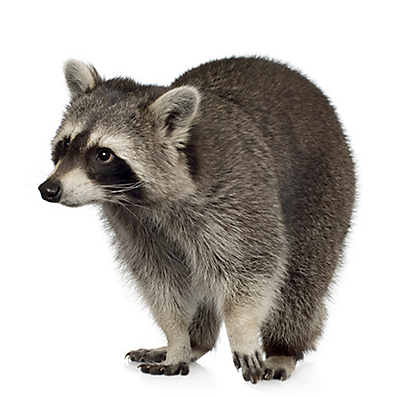RACCOONS
How to Get Rid of Raccoons Humanely
Getting rid of raccoons takes an integrated approach; applying several control methods at once will give you better success at eliminating raccoons and keeping them away
Remove Food and Water
Raccoons invade your yard or home in search of food. Make your yard less inviting and your raccoon control plan more successful by eliminating any potential food sources that might attract them.
Identify Areas of Damage
Knowing where your raccoon is spending most of its time and pinpointing the damage will help you target your control method.
Choose the Right Control Method
Once you’ve identified where your raccoons are frequenting, you will be able to choose a control method. It’s important to note that the more layers of defense you have against raccoons, the better your chances are at getting rid of them and keeping them off your property.
Raccoon Repellents
Use a repellent to keep raccoons out of frequented areas or to keep them off of objects and surfaces.

How to Get Rid of Raccoons
They’re furry. Even cute. They’re pet-sized and adorable enough to earn nicknames like Trash Panda and Shuffle Cat. But raccoons can be a menace when they make their homes in your attic or crawlspace.
The Damage Raccoons Can Cause
Those cute little furballs can be a whirlwind of damage in your attic or garage. They’ll do damage to your house itself, your property and even bring in the threat of disease.
Raccoons Bring Parasites, Leave Smell
Perhaps the worst damage can come when the raccoons decide to use an area of the attic for a latrine. It can stain the ceiling beneath with droppings, urine and their objectionable odors.
Raccoons can even bring parasites and diseases into your home. The raccoon roundworm is an infection spread to people by the accidental ingestion or inhalation of the roundworm eggs from raccoon feces. And it’s especially dangerous to children.
Protecting Your Home From Raccoon Damage
With cold weather and the raccoons’ breeding season just around the corner, now is the time to make sure your house doesn’t become a raccoon’s winter getaway.

How to Get Rid of Raccoons
The rustling sounds you hear near your garbage cans at night may not be wind gusts or a top-heavy container falling over.
Your yard may have become the favored feeding spot of a furry visitor. While raccoons may seem cute, they can be a pest to homeowners and farmers – and even a carrier of disease. That’s why it’s important to understand raccoons and their behavior should you spot one near your home.
Physical Characteristics
Researchers believe that over 10,000 different species of ants exist, but only a handful of breeds regularly venture indoors.
Here’s a guide to the most common household invaders and the risks they carry:
Adults may weigh from 10-30 pounds and measure two to three feet long (tail included)
Distinctive blackened areas around the eyes
Grizzled-gray fur with a bushy tail that features dark rings
Eats both plants and animals
May run up to 15 miles per hour and also swims
Found throughout most of the U.S.
Less active in winter, but do not hibernate
More active at nighttime as they seek out sources of food
While their activities are defined by the seasons, raccoons only live three to five years in most cases. Roughly 50-70% of their populations consist of animals under a year old. Their role within the food chain helps to prevent overpopulation.
A Raccoon’s Life Cycle Moves as Follows:
The spring months see the birth of a new generation of raccoons after a gestation period of about 63 days. Most new groups consist of one to four babies, called kits. The young stay with the mother for six to ten months.
The youngest raccoons are weaned during late summer and fall, at which point many will leave home to build their own dens.
As they reach adulthood, raccoons will roam about during winter and early spring in search of mates. Males (called boars) are known to travel greater distances than females (called sows) during breeding season as mating occurs only once per year.

How To: Get Rid of Raccoons
Behind that adorable masked face lies a determined forager and a potentially destructive intruder. When it comes to dealing with wild animals, there are seldom guarantees. But if you’re determine to get rid of raccoons on your property, you can do worse than start with the tips and tricks detailed here.
Sure, raccoons are sort of cute, but know this: If it feels threatened, a raccoon can be dangerous, particularly if it’s carrying a disease (e.g., rabies). Tread carefully, and remember that there are professionals trained to deal with raccoons and other creatures. Your local government most likely includes an animal control department with field operations aimed at helping residents cope with wildlife. Of course, if you’ve been frustrated by repeated incidents or feel the need to get on the case immediately, continue reading to learn how to get rid of raccoons safely and effectively, whether they’re causing trouble under your roof or strictly outdoors.
OUTDOORS
Raccoons are scavengers; if they’re hungry, even mere morsels of food left out in the open can lure them to your property. To eliminate a raccoon problem, therefore, it’s important to keep discarded food waste out of sight and to the greatest extent possible, contain or mask its odor. Purchase and use receptacles with lids that close tightly and lock into place. Additionally, consider double-bagging any trash that’s going to spend at least one night outdoors before your next scheduled garbage collection date.
Any food—even pet food—left outside can attract raccoons. If you must feed your pets outdoors, feed them only at certain times of day, and remove anything uneaten. If you and your family like to cook and/or dine al fresco, always take the time to clean up afterward. Here, it’s well worth being thorough; as a precaution, hose and wipe down your picnic or patio table at the end of a meal. For best results, use a cleaner that contains bleach, a chemical that goes a long way toward vanquishing odors. Note that bleach works so well at eliminating food odors, you might even pour some over any trash bags left outdoors in a unsecured receptacle.
INDOORS
While raccoons can make a real mess of your yard, strewing trash in all directions over a surprisingly broad radius, they can wreak even greater havoc indoors, endangering your family’s health and safety.

How to Get Rid of Raccoons
There are plenty of humane ways for how to get rid of raccoons. Here are some easy ways to get rid of raccoons.
It’s no secret that raccoons are a nuisance. On the hunt for food and a place to establish their den, they can show up in your yard, your attic, your chimney, rummaging through your garbage and more. While they’re not out to destroy your home sweet home, it is important to get them out and keep them out. Here’s how to get rid of raccoons.
If you see a raccoon nosing around in your neighbor’s trash, they would probably appreciate a heads-up. However, here’s a list of things your neighbor really wants you to STOP doing.
If you don’t have a raccoon problem yet, but you’ve seen them in your area, you’ll want to start with prevention. Keep food sources out of sight, with garbage well-secured in outdoor trash cans, using a thick lid and a weight or pressure straps on top. Also, be sure your pet’s food is kept indoors. Install a tray on bird feeder polls roughly six inches below the feed to catch any dropped seed, and be sure the feeder isn’t in a location near trees that the raccoon could use to jump from to get on the feeder. Also, be sure to cut trees back to six or eight feet from your home so raccoons can’t get to your roof and make their way into the attic to form their den.
How Do You Get Rid of Raccoons?
You can even deter raccoons from coming with cayenne pepper. These masked marauders hate the smell of the spice. Add one small canister of cayenne and one bottle of hot sauce to a gallon of water, then spray the solution all over your garden plants, bushes and shrubs, and reapply after a rainfall. There are various other repellents you can use as well, like Mint-X trash bags, which are specifically designed to repel raccoons. They’re all-natural trash bags that have a mint fragrance, which raccoons dislike. Motion-activated floodlights can also serve to deter raccoons.

Recent Comments